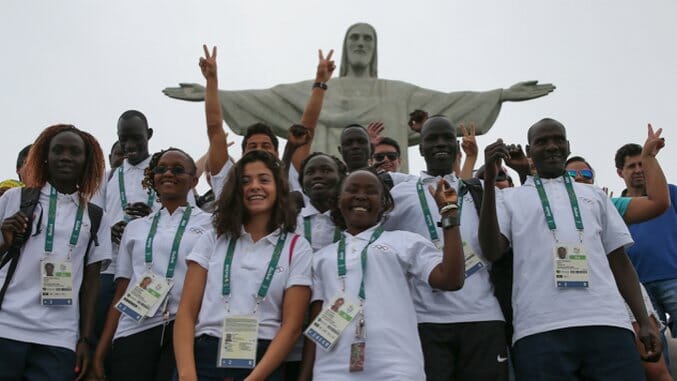Why the Olympic Refugee Team is So Important, and So Inspiring
Photo by Buda Mendes/Getty
Rio 2016 is the first ever games to have a team made up entirely of refugees. Their inclusion – their celebration – not only makes history, it is desperately important for four reasons.
1. It restores the heart of the Olympics
The Olympic brand is somewhat tarnished. The homophobic undercurrent of the Sochi winter games and the human rights concerns of Beijing are cases in point, not to mention the rampant corruption of the IOC. In these times of increasing awareness of global inequity, the games cost mammoth amounts of money, only for the stadiums and athlete villages to then languish, rarely used again. Then there are those pesky drug scandals.
In addition to the (many, tedious, disappointing) doping revelations, this year’s Olympics have been overshadowed by fears associated with poverty and lawlessness. The Australian competitors were vocal when their accommodations were sub-par; they even had laptops stolen from their rooms in the Olympic Village. There were fears that sailing and other water sports venues were so polluted that falling in would be a health hazard. This week, the diving and water polo pools turned green. The potential for mugging and other crime against athletes and spectators has also been debated, as Rio is famous for epitomizing the gap between the rich and poor. Numbers have been disappointing.
Despite these concerns the 2016 games has made history in more ways than the mere crushing of world records. The Rio Olympics have gone above and beyond with their inclusivity: The formation of the Olympic Refugee Team (ORT) is awesome.
The ORT is not about sponsorship deals. It’s not about national pride. It’s not even (so far) about winning medals. It’s about bringing out and celebrating the best in humanity. The ORT may not be at the very pinnacle of their fields (given their presumed lack of training opportunity, how could they be expected to be?) but their dedication to, and love of, sport in the face of adversity is truly inspirational. As Yiech Pur Biel (ORT team member, athletics, originally from South Sudan) told the BBC “Sport gave me a sense of belonging. Even if I don’t get gold or silver, I will show the world that, as a refugee, you can do something.”
What is the point of the Olympics? It’s about more than the individuals competing, more than national pride. It’s about seeing people striving to be the best that they can be, to have long, lonesome hours in the pool/on the track/on the field be recognized, to pay off, even if it doesn’t end on the medal podium. It’s about their stories. It’s a smash-up of cultures, all competing on an even playing field, all reaching for the same goal, and in doing so, transcending division. It’s, as I’ve been assured by an Olympics fanatic, “everyone together”. The ORT embodies this spirit.
We are all barracking for our national teams, but the ORT is elevated past that, as they belong to no-one, and everyone. Being an International Olympic Committee initiative reinforces that they represent all of us. That the IOC put time, resources and it’s reputation into fielding this team at a time of such crisis for refugees helps to lift the games up out of the scandals in which they often seem mired.
2. It humanizes refugees and offers hope
Walking out into Rio’s opening ceremony to thunderous applause, the ORT reminded us that they are people with hopes, dreams and goals. Their stories and abilities humanize not only them, but the millions of others waiting for safety around the world.
There have been other great Olympic moments this year. Who didn’t smile when they saw the North Korea – South Korea gymnastics selfie? Who didn’t get a teary eye when Fiji won their first ever Olympic medal in the Rugby Sevens? Who didn’t do a thoughtful double take at seeing the hijab/bikini beach volleyball photo? But this year, it’s been the personal stories behind the ORT athletes that demonstrate best the Olympic spirit.